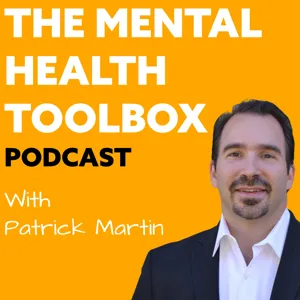Podcast Summary
The history of Cognitive Behavioral Therapy and its focus on thoughts, behaviors, and emotions: CBT is a therapeutic approach that focuses on identifying and challenging automatic thoughts to change emotions and actions, with a history rooted in the works of Adler, Kurt Adler, and Albert Ellis.
Cognitive Behavioral Therapy (CBT) is a therapeutic approach that focuses on the relationship between thoughts, behaviors, and emotions. According to Dr. Nigro, emotions are considered the byproduct of thoughts and behaviors. The history of CBT can be traced back to the works of Alfred Adler, Kurt Adler, and Albert Ellis. Ellis, in particular, is known for his confrontational approach to therapy, which later influenced Aaron Beck, the founder of CBT. Beck's approach involves identifying and challenging an individual's automatic thoughts, which are the thoughts that shape our perception of reality. By focusing on thoughts and behaviors, CBT aims to help individuals modify their thinking patterns and, as a result, change their emotions and actions. Dr. Nigro emphasizes that emotions are not the starting point in therapy, but rather the outcome of our thoughts and behaviors.
Comparing CBT to adjusting glasses for new perspectives: CBT helps change thought patterns by addressing schemas, dysfunctional beliefs, and setting clear goals, with the therapist acting as a guide and the client responsible for the journey.
Cognitive behavioral therapy (CBT) involves gradually changing perspectives and thought patterns. This process can be compared to adjusting someone's glasses, making them see the world differently. CBT also deals with schemas, which are sets of behaviors and thoughts that guide our actions in familiar situations. New experiences trigger us to pull out the appropriate file from our cognitive "file cabinet." Dysfunctional beliefs are another focus of CBT. For instance, if someone believes "Nobody likes me," a therapist would help them break down this belief and find the root cause. The therapeutic process doesn't stop in the office; the real work happens between sessions. The therapist acts as a GPS, guiding the client towards their goal, but the client is responsible for the journey. A clear, specific goal is crucial for successful therapy outcomes.
Define clear therapy goals: Be specific about therapy goals to guide progress, communicate openly with therapist, and remember therapy is a process requiring time and dedication.
For effective therapy, it's crucial to have clear and specific goals. Being vague about what you want to achieve, such as "I want to feel better," is not helpful. Instead, ask your therapist about your treatment goals and diagnosis. Therapy, especially from a cognitive behavioral therapy perspective, is goal-oriented and direct. By having clearly defined goals, you can guide the treatment process and make progress more tangibly. Set both short-term and long-term goals, and remember that therapy is a process that requires time and dedication. Don't be afraid to be honest and open with your therapist, as communication is key to making progress. Remember, therapists are not mind readers, and being clear about your goals will help ensure that you get the most out of your therapy sessions.
Understanding Needs vs. Wants in CBT: Focusing on wants in CBT allows for flexibility and reduces pressure, while recognizing needs can create unrealistic expectations. CBT's success depends on patient commitment and practice outside sessions.
Understanding the difference between needs and wants is crucial in cognitive behavioral therapy (CBT). While we often use these terms interchangeably, it's important to recognize that labeling something as a need can place undue pressure and create unrealistic expectations. Instead, focusing on wants allows for more flexibility and room for error. CBT is a powerful therapeutic modality for treating various psychiatric conditions, but it requires effort and dedication from the patient. The work doesn't just happen during sessions; it's essential to practice the techniques between appointments. CBT involves pushing patients, holding them accountable, and instilling hope, but it doesn't tolerate impatience or laziness. The effectiveness of CBT is directly related to the patient's commitment to the process. Cognitive dissonance, the discrepancy between thoughts and actions, is a common challenge in therapy. For example, someone might say they know smoking is bad while continuing to smoke. Understanding cognitive dissonance and learning to address it is an essential part of CBT. Overall, CBT is a valuable tool for personal growth, but it requires a willingness to put in the work.
Exploring Cognitive Behavioral Therapy Techniques: CBT helps individuals challenge thought patterns and face fears in anxiety disorders, identify and change negative thought patterns in depression, and encourages emotional and thought independence.
Cognitive behavioral therapy (CBT) is an effective approach used to treat various disorders. During our discussion, we explored how CBT techniques are applied to specific situations. For instance, we talked about how CBT can help individuals with anxiety disorders by challenging their thought patterns and encouraging them to face their fears. We also touched upon how CBT can be beneficial for individuals dealing with depression by helping them identify and change negative thought patterns. To give you a better understanding of how these techniques play out, we might have even engaged in some role-play scenarios during our next session. In the meantime, I encourage you to reflect on the importance of taking control of your emotions and thoughts. As Eleanor Roosevelt once said, "Nobody can make you unhappy without your permission." Remember, it's essential to strive for independence from the good opinions of others and focus on your own well-being. If you have any questions or would like to explore this topic further, please don't hesitate to contact me at psychologyunpluggedoutlook.com or through Psychology Today. Until next time, take care and be well.





